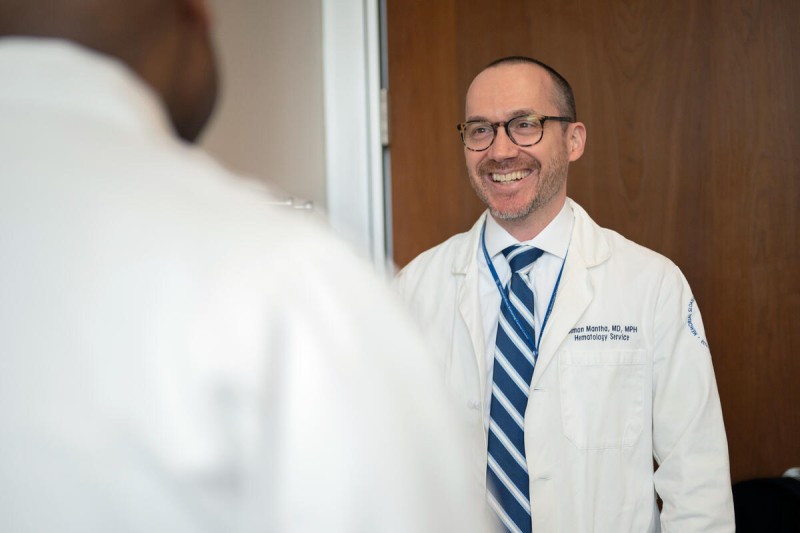
Simon Mantha is an expert at treating non-cancerous blood conditions, like thrombosis.
Blood clotting is also called coagulation. It is a normal process. It prevents excessive blood loss when you have a cut or other injury. Blood cells called platelets combine with special proteins called clotting factors to form clots. The clots stop the bleeding at the injured site. They dissolve after your injury heals.
Abnormal clotting can sometimes lead to the formation of a deep vein thrombosis (DVT). This is a blood clot that forms in a deep vein, usually in the leg. A DVT that detaches from a vein in another part of the body and travels to the lungs is called a pulmonary embolism.
Why Does Cancer Increase the Risk of DVT?
People with cancer are at an increased risk of developing these dangerous blood clots. Research has shown that there is a clear connection between cancer and DVT. This is because some of the genetic changes that cause cancer increase the activation of clotting factors. Many chemotherapy drugs used to fight cancer can also increase the activation of clotting factors.
If you already have a condition that increases the activation of clotting factors, your risk of developing a blood clot during cancer treatment increases more.
Certain conditions may increase your risk of blood clots. They include:
- inherited disorders, such as the Factor V Leiden mutation
- a prothrombin gene mutation
- a protein C deficiency
- a protein S deficiency
- an antithrombin III deficiency
Blood Clot Symptoms
DVTs and pulmonary embolisms reduce the flow of oxygenated blood throughout the body. However, many people with a blood clot in their legs or lungs do not feel any symptoms until the problem becomes life-threatening.
When symptoms occur, they may include:
- sudden pain and swelling in the legs
- sharp chest pain
- fast pulse
- bloody cough
- shortness of breath
- sweating or fever
- severe abdominal pain, vomiting, or diarrhea
Tell your doctor immediately if you notice any of these symptoms.
Diagnosing Blood Clots
Many blood clots are found incidentally. This might happen following a medical scan or during cancer treatment. At other times, a person may report symptoms that could indicate a blood clot during a routine follow-up exam. If our teams suspects a blood clot, we may perform one or more of the following tests:
- additional blood tests to measure the rate at which your blood clots and to identify protein deficiencies that prevent clotting
- a CT scan of the lungs to look for a pulmonary embolism
- a venous ultrasound (Doppler) to look for blood clots in your lower extremities
Our team can most effectively manage these problems without interrupting your cancer therapy by diagnosing and treating a blood clot as early as possible.
Blood Clot Treatment
Memorial Sloan Kettering provides a variety of treatments for people who develop blood clots during cancer therapy. Our hematologists (blood specialists) are experts in determining the best approach. We develop a plan that works with your other treatments. Our state-of-the-art Anticoagulation Clinic is staffed with nurse practitioners who are experienced in taking care of people receiving blood thinner treatments, including those taken by the mouth or by injection.
Treatment for a blood clot may include one or a combination of the following:
Anticoagulants (Blood Thinners)
Heparin and other medications can block the activation of clotting factors. These drugs are given by IV or by injection under the skin.
Inferior Vena Cava Filter
The inferior vena cava (IVC) is the large vein that delivers blood from the legs to the heart. Our experienced interventional radiologists insert a special filter into the IVC. This filter captures clot fragments before they travel to the heart or lungs. It is removed when it is no longer needed.
Thrombolytics (Clot Busters)
Medications such as tissue plasminogen activator can rapidly dissolve clots. These drugs are given through a catheter.
Thrombectomy
Surgery is sometimes necessary to remove a blood clot. This includes when a clot becomes life-threatening and does not respond to other treatments.
Anticoagulant and thrombolytic medications need to be handled carefully. Otherwise, they can increase your risk of bleeding. The hematologists and nurse practitioners in our Anticoagulation Clinic frequently monitor and adjust these medications. This careful attention reduces the risk of bleeding. It is especially important to watch these medications before surgery.
Our hematologists are helping to develop a new oral anticoagulant medication. It may cause fewer bleeding problems than current medications. Researchers at Memorial Sloan Kettering are also studying chemotherapy drugs to see which ones are more likely to cause blood clots.
Your doctor may recommend more ways to prevent blood clots during and after treatment. These might include wearing compression stockings and avoiding long airplane trips.
We’re available 24 hours a day, 7 days a week
